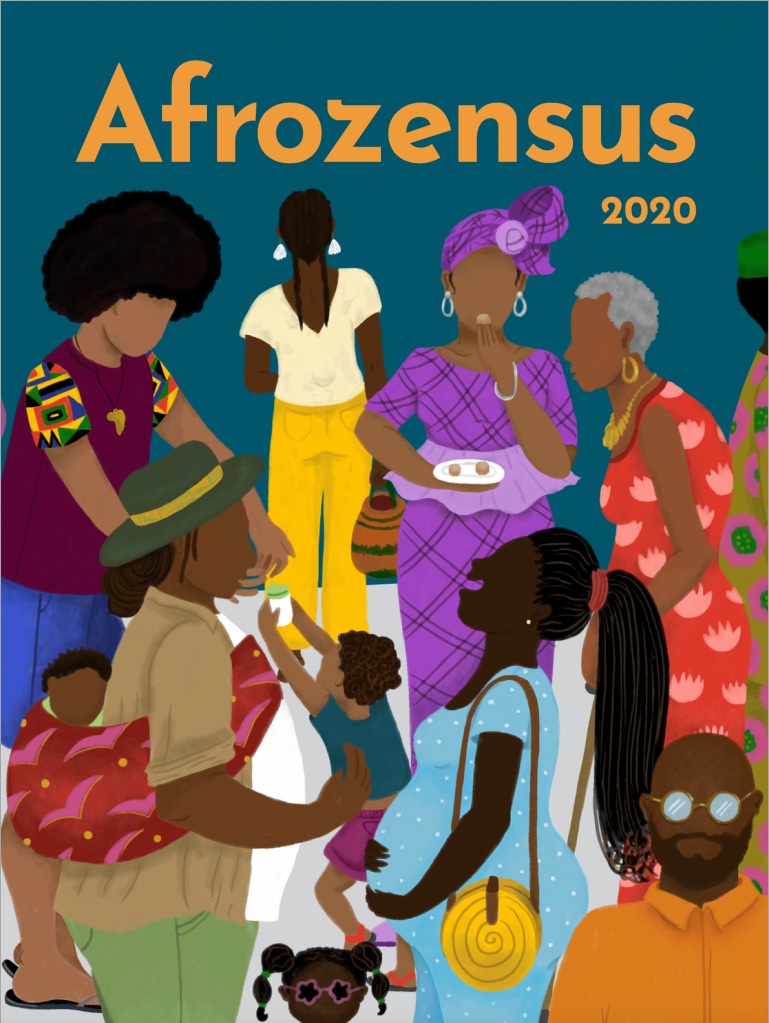The Afrozensus (“Afro-census”) is a study of the realities and lived experiences of thousands of Black, African, and Afro-diasporic people residing in Germany. Although more than a million people of African descent live in the country, no extensive statistics on the circumstances of these communities had been collected prior to the Afrozensus, mainly because the larger society almost completely ignores their living situations and the prejudices against them. Framed within a civil society project made possible by Each One Teach One e.V. (EOTO) and Citizens For Europe (CFE), the Afrozensus is constructed on Afro-centric research theory and practice, ensuring that Black perspectives and researchers are the leaders and determiners of this venture and its trajectory.
Created by Black people for Black people in 2020, the Afrozensus consisted of focus groups, interviews, and a country-wide online survey in which almost 6,000 people participated. Anyone over the age of 16 with a current direct connection to the African continent or the African diaspora and who was either living in or had recently lived in Germany was invited to take part in the survey. The central component of the report relays respondents’ experiences with discrimination, resilience, and empowerment.
To give context to the participants’ survey responses, the Afrozensus team took note of their sociodemographic information including age, gender/sexual orientation, education, language(s) spoken, income, impairment/disability, and geographical and family background. The Afrozensus then recorded people’s discrimination experiences in 14 different areas of life, with most of those surveyed reporting that they experienced discrimination “very frequently” in the areas of “media and internet” (24.4%), the “housing market” (17.5%), “police” (16.2%), and “public and leisure time” (13.6%). Where othering, (hyper)sexualization, and criminalization are three of the many ways in which anti-Black racism is displayed and experienced, the report explores how respondents handled discrimination and where they found sources of empowerment.
The Afrozensus and its findings are important because they invoke a sense of self-determination to its readers and participants. In the words of the authors, “empowerment has the potential to emancipate ourselves as Black people from other-directed reactions to anti-Black racism.” With the goal of garnering change for Black, African, and Afro-diasporic peoples in Germany, the researchers present participants’ calls for action in the form of recommendations to improve the living conditions of these communities and address and combat racism through the institutionalization of empowerment, community-based Black Studies research, increased representation, and other strategies.
The Afrozensus is intended as one step further in the ongoing process of critically examining anti-Blackness and Black life in Germany. A project like the Afrozensus may not provide a definitive, complete picture, but with plans to conduct further surveys in the future, the researchers and activists behind the Afrozensus will continue to shed light on that what has previously been largely invisible.
Kennedy Fue

Source: Muna AnNisa Aikins, Teresa Bremberger, Joshua Kwesi Aikins, Daniel Gyamerah, and Deniz Yıldırım-Caliman (eds.), Afrozensus 2020: Perspektiven, Anti-Schwarze Rassismuserfahrungen und Engagement Schwarzer, afrikanischer und afrodiasporischer Menschen in Deutschland (Berlin, 2021).

The Afrozensus (2020) by Kennedy Fue is licensed under a Creative Commons Attribution-ShareAlike 4.0 International License. Permissions beyond the scope of this license may be available at https://blackcentraleurope.com/who-we-are/.